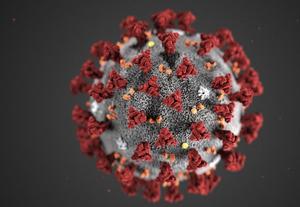 This file handout illustration image obtained Feb 3, 2020, courtesy of the US Centers for Disease Control and Prevention, and created at the US Centers for Disease Control and Prevention (CDC), reveals ultrastructural morphology exhibited by the novel coronavirus, COVID-19. (LIZABETH MENZIES / CENTERS FOR DISEASE CONTROL AND PREVENTION / AFP)
This file handout illustration image obtained Feb 3, 2020, courtesy of the US Centers for Disease Control and Prevention, and created at the US Centers for Disease Control and Prevention (CDC), reveals ultrastructural morphology exhibited by the novel coronavirus, COVID-19. (LIZABETH MENZIES / CENTERS FOR DISEASE CONTROL AND PREVENTION / AFP)
WASHINGTON - A randomized, controlled clinical trial has begun at the University of Nebraska Medical Center (UNMC) in Omaha, the United States, to evaluate the safety and efficacy of the investigational antiviral remdesivir in hospitalized adults diagnosed with COVID-19.
Clinical trials of remdesivir are also ongoing in China
The US National Institutes of Health (NIH) announced on Tuesday that the first trial participant is an American who was repatriated after being quarantined on the Diamond Princess cruise ship that docked in Japan and volunteered to participate in the study.
ALSO READ: TCM clinic offers herbs in fight against virus
Clinical trials of remdesivir are also ongoing in China where more than 200 patients with severe and critical symptoms and over 30 patients with mild and common symptoms have been enrolled in the trial.
At least one COVID-19 patient in the United States had used the compound for a treatment via Compassionate Use approved by the US Food and Drug Administration (FDA).
Currently, there are no specific therapeutics approved by the FDA to treat people with COVID-19.
Remdesivir is an investigational broad-spectrum antiviral treatment. Initially developed against Ebola infections by American pharmaceutical company Gilead Sciences, it has shown fairly good antiviral activity against the novel coronavirus at the cellular level.
READ MORE: New coronavirus cases outside Hubei drop to 5
"A randomized, placebo-controlled trial is the gold standard for determining if an experimental treatment can benefit patients," said Anthony S Fauci, director of National Institute of Allergy and Infectious Diseases under the NIH.


